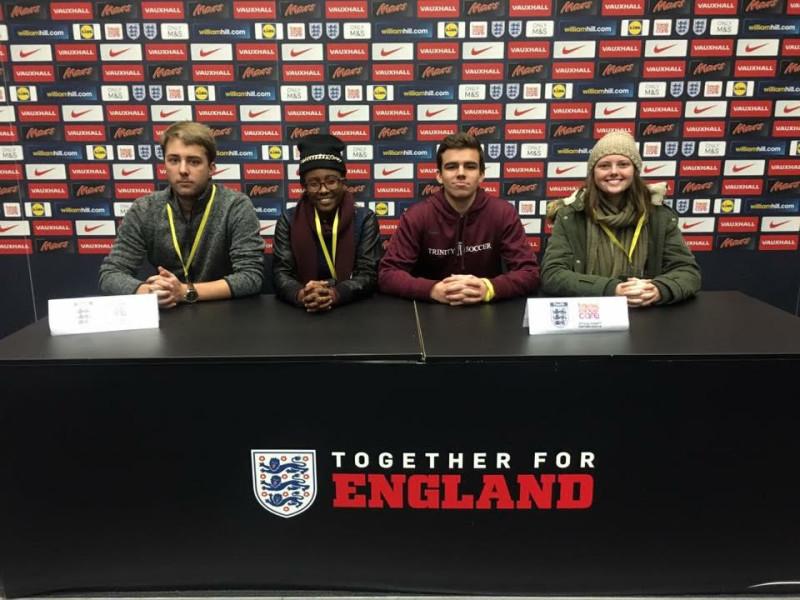For many students, winter break is an awesome opportunity to catch up on sleep, relax and recuperate from the stressful fall semester. While many students use the hiatus in this fashion, other students use the month-long opportunity to expand their education and gain new experiences by traveling. This winter, Trinity sent two groups of students abroad; one group ventured to Cuba, and the other journeyed to London. Although each trip abroad offered varying adventures and opportunities for the groups,
the ability to go abroad this break was a
mind-blowing experience for each participant, as everyone returned with new stories and memories to share.
Students who went abroad to London this winter primarily learned about the impacts of sports on English culture, and the timing of the trip allowed students with other university obligations to participate.
“A sports trip in London that didn’t conflict with my baseball commitments at Trinity was a perfect fit! The baseball season makes semester abroad trips impossible, so this trip over Winter Break was exactly what I needed and my parents were all for it,” said Drew Butler, a senior marketing major.
The trip provided never-ending opportunities for the participants to learn about sports throughout their trip.
“I learned how much of English culture revolves around sports. From all the different teams in London, and all the different sports that go on, you are constantly surrounded by sports. Everywhere you go you are provided an opportunity to engage with others and immerse yourself in sports,” Butler said.
This trip allowed participants to explore several areas of sports culture in London.
“We were able to go in player locker rooms, royal suites, and training rooms at some of the most prestigious sporting venues in all of London,” Butler said.
Trinity faculty worked hard to make the trip beneficial, allowing the students to experience as much as possible.
“The trip was set up and run without a single hitch. Dr. Tingle and Coach McGinlay organized the trip to perfection,
and they took time out of their holidays to set up a trip of a lifetime for us. Our whole group is incredibly grateful for that, and without them the trip would not have been possible,” Butler said.
Other students were able to visit Cuba as it began to open its doors to more visitors for the first time in decades.
“I chose to go abroad mainly because I really wanted to see Cuba before it becomes overwhelmed by US tourists,” said Joseph Khalaf, a sophomore accounting major.
This trip allowed participants to explore and educate themselves on the vastly different politics of Cuba.
“The experience I had while in Cuba has corrected a lot of my preconceived “˜socialism-is-bad’ thoughts. Seeing it in practice has allowed me to appreciate a different form of government. One of the discussion topics during the trip was “˜Who is more free?’ because there is so much criticism towards “˜the system’ in the United States,” Khalaf said.
This trip introduced the students to several aspects of politics that they hope they’ll take more notice of as they observe their surroundings back in the states.
“It was very interesting to see all of the Cuban government propaganda and now I feel I am more likely to notice similar practices in the U.S.,” Khalaf said.
Some participants chose to go on the Cuba trip to learn more about its environment.
“I’m really interested in how biology interacts with foreign policy issues, so the Cuba program was a perfect fit for me,” said Olivia Roybal, a first year Biology major. “Cuba has remarkably intact ecosystems, especially for being a Caribbean island. Cuba’s political and economic climate is a major contributing factor to this, and the Cuban government has an interesting and active relationship with environmental protection, so I jumped at the opportunity to witness this firsthand.”
The interactions that this trip provided with students allowed them to gain first-hand knowledge about Cuban citizens and settings.
“I liked talking and interacting with Cuban people. I also really enjoyed learning about sustainable, nonindustrial agriculture. We toured a few urban organic farms and a few rural organic farms that were fascinating, especially in contrast with American farming practices,” Roybal said.
Ultimately, the trip provided insight on how politics have negatively influenced our perception of Cuba.
“This trip highlighted that Americans are generally ignorant about Cuban history and the country’s relationship with the United States. With the eventual lifting of the embargo, it is even more important for Americans to have an objective understanding of Cuban history,” Roybal said.
The opportunity to go abroad was a life-changing opportunity for all involved. As each of the participants traveled for varying reasons, each came back with memories of experiences unlike any other. Students interested in pursuing the chance to study abroad are encouraged to reach out to the faculty members of the study abroad office in Chapman 245.







